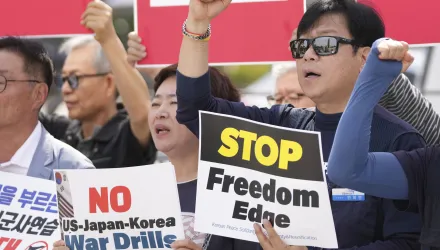International Security is America's leading peer-reviewed journal of security affairs.
Abstract
Robert Ross of Boston College considers the prospects for a U.S.-China war over Taiwan. Ross praises the first Bush administration and the Clinton administration for maintaining the U.S. commitment to protect Taiwan from a potential Chinese invasion while furthering U.S. engagement with the mainland. In contrast, he criticizes the current Bush administration’s policy of constructing “a U.S.-Taiwan defense relationship focused on wartime cooperation.” The administration’s decision to increase U.S. arms sales to Taiwan and to consider selling missile defense technologies to Taiwan unnecessarily challenges Chinese security interests in the Taiwan Strait and increases the likelihood of conflict. Instead, Ross asserts that as long as Taiwan does not declare independence from China, the United States can be confident that it can continue to deter the Chinese use of force against Taiwan for decades to come.
From the first page...
"Since the end of the Cold War, the strategic focus of the United States has shifted from Europe to East Asia, in recognition of East Asia’s growing economic importance and the strategic dynamism of the People’s Republic of China (PRC). In this context, the prospect for war in the Taiwan Strait has emerged as a major preoccupation of U.S. policymakers. The March 1996 U.S.-China confrontation, when the PRC carried out military exercises and missile tests near Taiwan and the United States deployed two aircraft carriers to the region, placed this concern at the forefront of U.S. strategic planning. The result has been increased U.S. arms sales to Taiwan, the beginnings of a U.S.-Taiwan defense relationship focused on wartime cooperation, and heightened U.S. interest in missile defense.
The assumption of the George W. Bush administration is that war in the Taiwan Strait is sufficiently likely that the United States must strengthen its diplomatic and military ties with Taiwan, even though such ties could disrupt U.S.- China relations and regional stability. But the analysis supporting this key assumption is lacking. In the aftermath of the Cold War, interest among scholars and policymakers in deterrence theory and in its application to U.S. foreign policy has languished."
Ross, Robert. “Navigating the Taiwan Strait: Deterrance, Escalation Dominance, and U.S.-China.” Fall 2002



